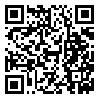BibTeX | RIS | EndNote | Medlars | ProCite | Reference Manager | RefWorks
Send citation to:
URL: http://payavard.tums.ac.ir/article-1-5120-en.html
Background and Aim: Stewardship and delivery of health services are considered as the most important areas in the healthcare system of the Islamic Republic of Iran in 1404. This study was conducted to investigate the main challenges in medical education stewardship because of its importance in the management and leadership of education from the viewpoint of education process providers.
Materials and Methods: This qualitative research was conducted using thematic and framework analyses to obtain the collective view of faculty members of Medical Sciences Universities in Iran. The data were collected applying deep semi-structured interviews. To increase the acceptability of the study, four criteria of Lincoln and Gupta were used. Codes, categories and themes were extracted by expert researchers of qualitative studies who had no conflict of interests with the topic.
Results: Of the 24 faculty members interviewed, 7 were females and 17 were males. They comprised 5 full professors, 8 associate professors, 9 assistant professors and 2 lecturers. The findings of the interviews were categorized in three main lines of stewardship in health system in the form of main and sub themes so that there were 2, 2 and 5 main themes in each line, respectively.
Conclusion : Since many of the challenges extracted from the present interviews are considered as essential interventions for achieving the stewardship functions of health system -- and, as a result, medical education -- , it is important to pay more attention to these challenges and at the same time conduct more complete studies to get more practicable solutions to these problems.
| Rights and permissions | |
 |
This work is licensed under a Creative Commons Attribution-NonCommercial 4.0 International License. |





